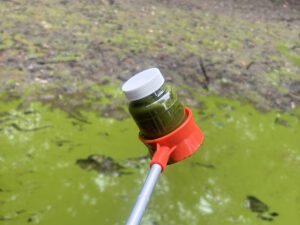News
Raleigh defers vote on rezoning Walnut Creek land
Environmental, Flooding, Neuse River Watershed, Sound Rivers, Stormwater, Stormwater Runoff, Water Quality
Posted on December 7th, 2023
The area proposed for residential rezoning in the Walnut Creek watershed.
This week, Neuse Riverkeeper Samantha Krop joined Partners for Environmental Justice to share concerns with the Raleigh City Council about a rezoning of land in the Walnut Creek watershed. A proposal seeks to rezone a 17-acre tract from conservation to residential.
Some of those concerns include increased flood risk in an area already listed on Raleigh’s “Frequent Flooding” map, significant erosion from additional stormwater runoff, sedimentation impacts from construction to small feeder streams to Walnut Creek, worsened flood risk for an underserved community and impacts to a federally-designated impaired waterway with a history of dumping, industrial pollutants and urban flooding.
“Ideally, the City of Raleigh would look to satisfy the need for developing low-income housing by utilizing other available assets like existing parking lots, and re-developing rather than converting valuable greenspace,” Sam wrote in her comments.
Sam has met with several Raleigh City Council members to discuss the issue and has more meetings scheduled.
“We will continue to work with our partners to inform the city council about our concerns, and will be participating in January’s rezoning hearing,” she said.
Related News

Oyster Roast 2025: the best one yet!
November 20th 2025

Riverkeeper: Durham UDO plan has ‘major shortcomings’
November 20th 2025

Sound Rivers breaks ground on innovative stormwater solution
November 20th 2025

Riverkeeper a partner in algal bloom research
November 20th 2025

AI data center community meeting, Kingsboro
November 20th 2025

Updated: Algal bloom spotted on Runyon Creek pond
November 13th 2025

Slocum Creek pollution: good news offsets the bad
November 13th 2025

7 more sites added to a growing Water Watch
November 13th 2025

